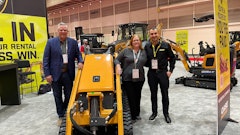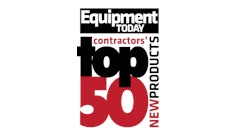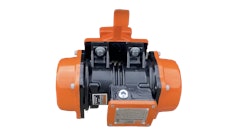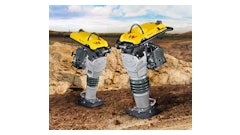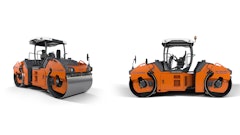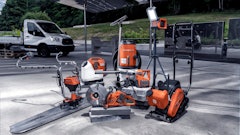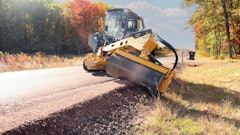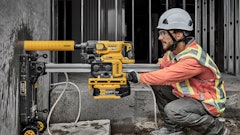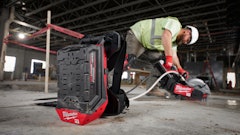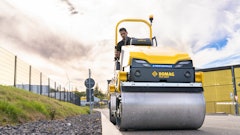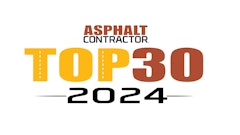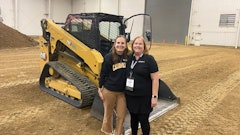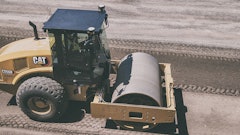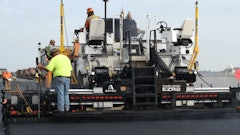
Keeping your rollers operating at peak efficiency throughout the season can help you meet both quality specs and deadlines. Here are 10 tips to help you get quality paving jobs done on time.
1. Keep the roller clean. Becky Gallert, product manager for compaction at Wacker Neuson Corp., says this ideally is done at the jobsite before hot mix and dust can harden. Failure to keep the roller clean will result in it driving unevenly and could cause imperfections in the mat.
2. Conduct daily maintenance checks. "Do a walk-around on the machine," says Todd Brooks, product support representative for Volvo Construction Equipment. "Inspect the drums for scarring or dents and the scrapers for wear. Look for loose hardware and make sure the shock mounts aren't broken."
Look for loose wiring and hoses, check the ground for puddles from leaks (a sign a hose may be loose), and check the electrical controls. If a switch isn't working, make sure one of the wires isn't loose. Make sure backup alarms, warning beacons, and headlights are operating properly, and check the parking brake.
3. Check oil levels, engine and hydraulic fluid. If it's a liquid-cooled engine make sure to check the coolant level.
4. Check the air filter daily. Clean it as needed. "If you don't check it you usually will cause damage to the engine," Gallert says. "If you can't get air to the engine the engine heats up and that causes an engine failure of some type."
5. Check radiator fins and make sure they're not clogged. "Debris or material caked in them will make the engine run hotter," says Juan Quiros, product support manager for Multiquip. "It could overheat to the point where it shuts down, you wait until it cools, then add fluid and you're good to go. Or it could overheat to the point where it damages the engine bloc in which case you're looking at a significant expense."
6. Add fuel at the end of the day. Brooks says fueling the roller at night reduces the likelihood of condensation in the tank. Quiros adds that filling the tank at the end of each day assures greater productivity the next day. "If you don't check, and you don't check in the morning, you might have to stop in the middle of a job if the roller runs out of fuel," Quiros says.
7. Grease moving joints and bearings. "If you have moving parts and you don't grease them, they're likely to fail. It's one of the things everyone knows but often don't do," Gallert says.
Brooks agrees most contractors neglect greasing articulation joints and the steering cylinders. "If these points are not greased, the bearings will need replacement much sooner than they normally would," Brooks says. "The bearings should last for years, but if they're not greased, they could wear out in a year or two. The bearings are expensive, so they should be taken care of."
8. Monitor wear on drum scrapers. Brooks says most drum scrapers are spring loaded, so make sure they are movable, are not stuck in one position from dirt or rust, and are in contact with the drums. Quiros says drum scrapers are usually positioned 3-5 mm off the drum surface, though some contractors like to position them closer.
"As the scraper wears, the space between the scraper and the drum increases, allowing more asphalt to cake on the drum. So check and move the scrapers closer to the drum," Quiros says.
9. Fill with clean water from a known source. Then check the tank regularly for algae, calcium deposits, or other contaminants. The water goes from the tank to the sprinkler bars and dribbles out over the front and rear drum, serving as a lubricant to prevent asphalt from sticking to the drum. "On jobsites there are various sources of water, and when you don't have control over the water supply you pick up sediment, contaminants, sand etc. and that can get into the water tank and can clog it up," Quiros says. He says clean water is also essential for the sprinkler bars. "Even using clean water you can get calcium deposits on the sprinkler system, just like you get on a shower head at home.
10. Use the machine properly. Gallert says using the roller for it's designed purpose can reduce breakdowns and general wear and tear - in addition to giving you better performance. "People tend to overwork these smaller machines all the time, figuring that they can get the same performance from a smaller roller as a larger one. But overworking a smaller roller will lead to premature failure," Gallert says. She says most unit's specs define best uses or frequency of use recommendations for equipment.






